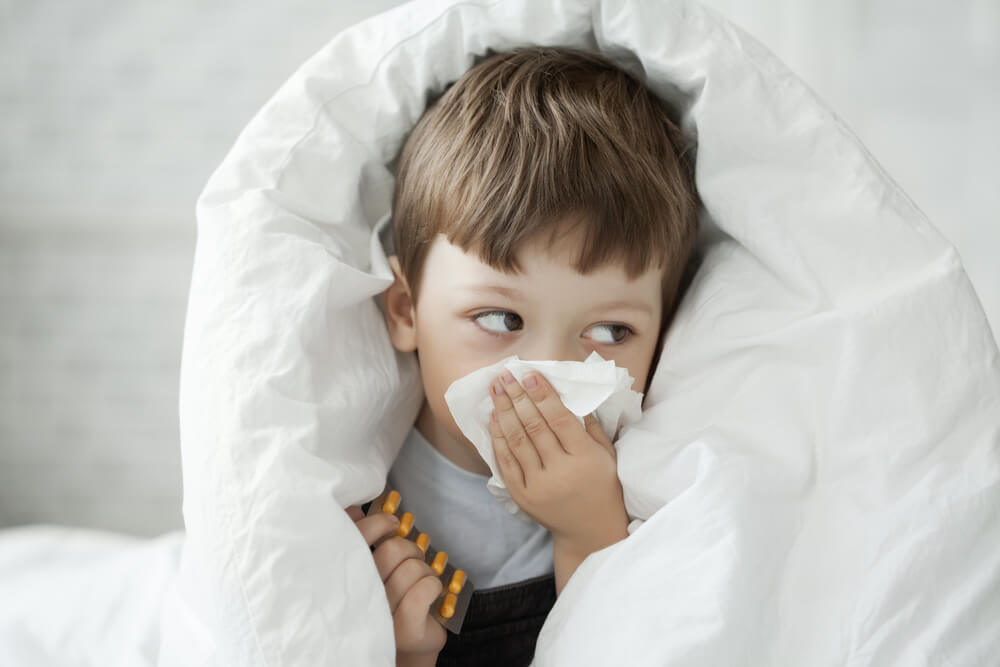Adults may not panic when they come down with the flu, but it’s a different story when it’s your child who’s sick. Seeing your toddler ill is understandably upsetting and often very scary, especially if you know that children’s immune systems are not that strong compared to adults. An illness that an adult can easily get over is more likely to be life-threatening in young children. And with thousands of people catching the flu each year, you want to be sure you’re protecting your child from a disease that can be fatal but doesn’t have to be. Get familiar with the symptoms and risks, and the flu treatment child needs to have in order to get healthy.
What Is the Flu?
The flu is a respiratory infection caused by influenza viruses. There are multiple types of flu viruses, but types A and B are the ones responsible for yearly flu epidemics. These are highly contagious and can cause mild to severe illness that can often lead to hospitalization, especially in children, elderly patients, or those with other health conditions. Luckily, vaccines are available to prevent illness caused by the flu in patients of all ages, and doctors recommend patients get these vaccines each year.
Flu Symptoms
Since influenza is a respiratory illness, it can often be difficult to differentiate between the flu and the common cold, especially in mild cases. But because the flu can be especially life-threatening in young children, it’s important to know the signs and to understand when to take child to doctor for flu. If you’re unsure, it’s wise to err on the side of caution and give your child’s pediatrician a call and they can give you advice on what to look for or whether you should bring your toddler in.
Common flu symptoms in toddlers include:
- Cough
- Sore throat
- Runny or stuffy nose
- Fatigue
These symptoms also appear in the common cold, so if your child is only demonstrating these symptoms, just keep a watchful eye on their condition. If they start to show further symptoms, then it may be the flu. These include:
- Fever
- Body aches
- Headaches
- Vomiting
- Diarrhea
Vomiting and diarrhea are not always associated with the flu in adults, but they are very common flu symptoms in children. It’s also worth noting that some people can have the flu and show respiratory symptoms without developing a fever.

When to See a Doctor
Though the flu can be mild and most healthy adults can get better from it without interference, that’s not always the case for young children. Some children are considered especially high risk for flu-related complications. Any child under five is at heightened risk just because their immune systems are still developing, and children under six months cannot be vaccinated against the flu, leaving them more open to infection. Older children with underlying health conditions (such as asthma, heart disease, and metabolic disorders) are also at risk, either because of medical complications from the flu itself or because they can’t safely be vaccinated.
The CDC has a handy list of flu symptoms that warrant an emergency. Keep an eye on your child’s symptoms and seek medical care right away if they start to exhibit any of these emergency symptoms:
- Difficulty breathing or rapid breathing, lips or face turning blue, or ribs visibly contracting when breathing
- Chest pain or severe muscle pain
- Dehydration
- Lack of alertness
- Fever above 104, or any fever in infants under three months
- Symptoms such as fever and cough that improve but then worsen
- Complications with chronic conditions
If your child is exhibiting any of those symptoms, it is critical that you seek emergency medical attention right away. This list, however, is not exhaustive. If you see any symptoms that are concerning, you should consult your child’s pediatrician or family doctor. They will be able to advise you if a symptom is life-threatening and needs emergency care or if you should bring your child in for a doctor’s appointment.
Treatment
You may be wondering, how long does the flu last in kids? The duration varies, but most young children will recover in a week or less. If the case is severe enough or if your child develops pneumonia, it could last much longer and will require medical attention. No matter what other flu treatment a child is receiving, rest and fluids are critical to their recovery.
Keep your child home from school, daycare, or other activities while they recover, and allow them to rest in bed. Their immune system is working hard to fight off the virus, which takes a tremendous amount of energy. Bed rest allows your child’s body to conserve energy so they can use their body’s resources in fighting the influenza virus instead of typical daily activities.
Make sure to keep your toddler well hydrated, too, by offering them plenty of fluids, especially if they are running a fever. As the body fights the flu virus, your child may develop a fever which can cause them to sweat. They may also experience vomiting or diarrhea. All of these symptoms will lead to massive amounts of fluid release, and it’s important to keep the body replenished by giving your child fluids. Water, electrolyte drinks, and warm beverages and soups can replenish and rehydrate your child, loosen mucus, and soothe scratchy throats or congestion. Just be careful to avoid sugary or caffeinated drinks like fruit juice and soda.
If you bring your toddler to their pediatrician for flu symptoms, they will be able to diagnose the cause as influenza or something else. From there, your doctor may choose to prescribe medicine.
Some medications are available over the counter, such as acetaminophen or cough medicine. Acetaminophen — the active drug in Tylenol and similar over-the-counter painkillers — will help ease your toddler’s body aches and headaches. It also has a fever-reducing effect, keeping your child comfortable and safe while their body fights off the virus. If your child has a fever and pain as flu symptoms, you should not give them aspirin. Opt instead for a painkiller containing acetaminophen as aspirin has been known to lead to a life-threatening condition in children with viral illnesses.
Your child’s doctor may also prescribe or recommend cough medicine. Depending on the specific ingredients, these medicines may reduce mucus production, suppress coughing, or soothe scratchy throats, keeping your toddler comfortable as they recover. Some cough medications are available over the counter while others may require a prescription.
Finally, your child may be prescribed antiviral medication. This type of medicine helps fight against viruses, but they don’t cure them. They are only available with a prescription and must be started within two days after symptoms begin. They also can carry strong side effects. Your pediatrician will be able to consult with you to determine if antivirals are the right choice for your child’s flu treatment.

Prevention: The Flu Vaccine
The flu is typically preventable with an annual influenza vaccine (the flu shot). While the vaccine may not be appropriate for some toddlers with major underlying health conditions, the vaccine is generally recommended for children over the age of six months. Speak to your pediatrician about your options. Prevention is your child’s best defense against influenza.
Worldwide Pediatrics Group
It can be scary to see your child get sick. Remember that the flu is a common illness and is typically easy to recover from. Call your pediatrician right away if you notice any worrying symptoms, and be sure to give your child plenty of rest and fluids.
Looking for a pediatrician?
Contact Worldwide Pediatrics for top-notch, patient-first care and doctors who work hard to keep your family healthy and happy. We’re here to help your child get healthy and happy. Get in touch with us today.



